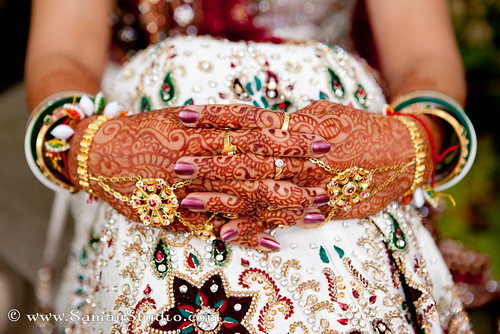The panetar is a typical Gujarati wedding outfit
for brides. Both Hindu and Jain brides wear a panetar and a gharchola. The
panetar and gharchola form an important aspect of the wedding ritual. The
panetar sari is a gift by the bride’s maternal uncle while the gharchola sari
is the gift from her new in-laws. Historically, the bride wore the panetar at
the beginning of the wedding and then gharchola at the end of the wedding
ceremony.
Today, it is
common for the bride to wear a gharchola chunni over her head and shoulder to
symbolize her movement from one family to another.
The paneter is an unique silk sari or chenia choli with with a white body and red border. The plain white body is woven in Gajji silk with linear stripes or checks in gold zari. There are tie dyed (bandhani) motifs usually yellow/gold or green to adorn the sari. You can see the details in the photos below.
The paneter is an unique silk sari or chenia choli with with a white body and red border. The plain white body is woven in Gajji silk with linear stripes or checks in gold zari. There are tie dyed (bandhani) motifs usually yellow/gold or green to adorn the sari. You can see the details in the photos below.
The gharchola is a sari that the
bride receives from her inlaws. The weaving technique of the gharchola
originate from the region around Khambat in southern Gujarat. Gharcholas are
first woven by using silk and zari thread and are then later embellished by
bandhani work.
The gharcola comes in a grid
pattern that is dyed in red. Some communities use a green gharchola with red, yellow,
and white bandhani work. The zari checks or grids appear in forms of 9, 12, or
52. The borders of each grid is in zari.
 The bandhani in the center of each grid style
around various themes of peacocks, floral patterns, or religious references. Where
more than two dye colors are used, the design is known as ‘phulwari’ meaning
‘garden.’ When animal motifs (peacock, elephants, birds) predominate, the pattern is known
as ’shikari,’ which means ‘hunting scene.’ Families may choose any decorated
style of gharchola, though they tend to have symbolic meaning in the family.
The bandhani in the center of each grid style
around various themes of peacocks, floral patterns, or religious references. Where
more than two dye colors are used, the design is known as ‘phulwari’ meaning
‘garden.’ When animal motifs (peacock, elephants, birds) predominate, the pattern is known
as ’shikari,’ which means ‘hunting scene.’ Families may choose any decorated
style of gharchola, though they tend to have symbolic meaning in the family.
Happy Dressing!
Happy Wedding!!
Shubh Vivah- The Wedding Planner
Image Source:






ReplyDeleteDear patrons, we had the finest architect hall design for the best utility and safety. Also to impress upon your guest, we have designed the hall to look like an architectural marvel. We hope you love our palace and use it to fulfil its role as one of the best marriage hall near tambaram